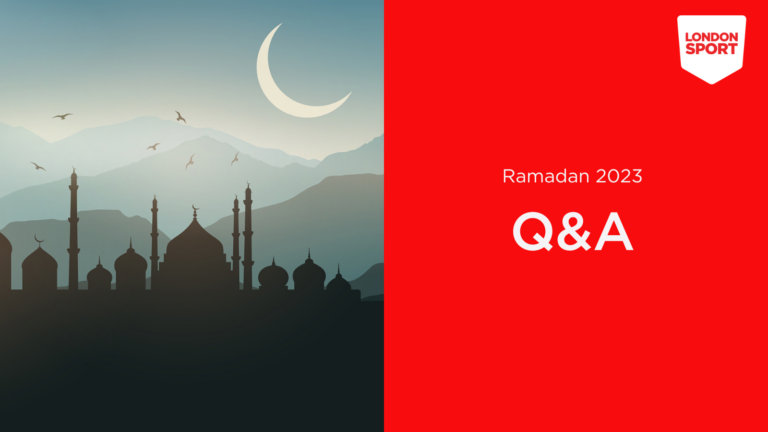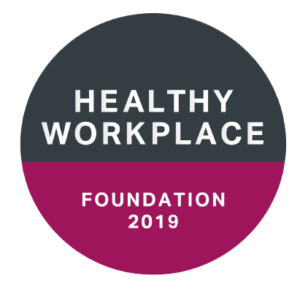Ramadan is the Arabic name for the ninth month of the Islamic calendar.
It is considered one of the holiest months for Muslims and is marked by a period of fasting, one of the Five Pillars of Islam. Muslims all over the world observe the holy month by carrying out acts like fasting and praying that bring them closer to their faith.
As Ramadan draws to an end, London Sport’s Communications Officer, Qasim Zaidi, and Development Manager, Naser Mohamed, answer questions about the holy month of Ramadan, including sport and physical activity provisions for Muslims who are fasting.
What is the meaning of Ramadan and why is it significant?
Naser: Ramadan is the 9th month in the Islamic calendar. It is particularly significant as we believe it is when the Quran was revealed to the Prophet Muhammad (peace be upon him). It is a pillar of the Islamic faith and fasting during this month is compulsory for all Muslims who are not exempt.
Qasim: Ramadan allows us to be closer to our faith and appreciate how fortunate we are to have a meal when we do break fast. Of course, this is a privilege, not everyone is lucky enough to have.
What adjustments in day-to-day life and workday do you need to support you during this period?
Naser: The nights are quite hard during Ramadan as we spend a significant amount of time on devotion. It is also quite hard to get sustenance during the small window. As such I adjust my sleeping patterns greatly during Ramadan to compensate. The flexible working patterns at London Sport have been great, allowing me to have a later start. The days with earlier meetings have been more challenging.
Naser: Competing with meeting rooms for prayer space is a little uncomfortable, so maybe during Ramadan some protected time – 10/15mins would be enough.
Qasim: Reassure employees that they can take shorter, more frequent breaks as opposed to one long break. Some people who are fasting prefer this to help break up the day.
I love that it makes you feel closer to your religion. What about it makes you feel closer?
Naser: Fasting in the month of Ramadan is one of the 5 pillars of Islam – the month requires Muslims to forsake eating and drinking and to prioritise God consciously through acts of compulsory and voluntary worship. During Ramadan I spend significantly more time reading and memorising the Quran, being charitable or volunteering, as well as communal night prayers called ‘Taraweeh’ – this allows me to feel closer to my faith.
Qasim: During Ramadan I spend a lot more time praying and refraining from things that would otherwise be a distraction to my relationship with God and my religion, and discussing topics that have deeper meanings with peers.
How does the fast hit you during the day? How do you keep going with day-to-day activities when your energy and hydration levels are low?
Naser: Headaches are an issue for me during Ramadan; hunger, dehydration, and screen time all play a part. Hunger pangs and feelings of lack of energy. Keeping myself engaged and busy helps. Being self-aware of the purpose of Ramadan and being God-conscious is primarily how I stay strong. If I have meaningful, time-consuming, demanding, and engaging tasks my concentration is actually better as I am more focused, and less distracted by food or thinking about what I will have for lunch.
Qasim: Concentration levels decrease slightly, and energy levels become depleted, particularly in the late afternoon. As much as I miss the food/water, I miss the small tea/coffee breaks that would ordinarily keep me going throughout the day.
Does everyone have to fast during Ramadan, are there any exemptions?
Qasim: There are some exemptions: Those who are sick/ill, Children who have not yet hit puberty, pregnant women, menstruating women, and those travelling over a certain (long) distance.
Other than fasting, what are the other key changes/opportunities for yourselves during Ramadan?
Naser: Reading the Quran and memorising more of it, praying, and night-time routine changes for me drastically during Ramadan. I spend a lot more time with family, spend more time at the mosque, host Iftars (dinners) for friends and family, spend more time in acts of worship. Additionally, Ramadan serves as a month where I can focus on my moral development i.e reduction of swearing, arguing, and backbiting, increase in acts of kindness and charity, reinforcing my principles, and sharing my faith with friends.
What are the things you either look forward to most or find most challenging (if at all) about Ramadan?
Naser: Surprisingly eating what I’d deem a meaningful amount to provide sustenance is more of a struggle than one would think – your stomach shrinks, and one glass of water will make it hard for you to eat much, so you must be very tactical. Additionally, it is important not to be gluttonous and overfill yourself so that you can function that evening and go to the mosque to spend extended time in prayer. However, Ramadan dinners are the best! It is a month when our culture is expressed so vividly at the dinner table. Waking up for pre-fast meals and morning prayers is a challenge and going back to sleep after equally so.
Qasim: The dinners (Iftar) in Ramadan are my favourite part! My mum doesn’t typically enjoy cooking, but she pulls out all the stops for these 30 days – anything I want on any given day, she will make it and more! It truly makes you appreciate having food on the table at the end of a long day which we would take for granted at any other time of year.
Sport and physical activity-related questions about Ramadan
How can sports coaches/teams better cater to players who are fasting?
Qasim: Understand that participants who are fasting may need to stop/take breaks if they are low on energy and have not consumed anything all day. Evening activity is better when it is cooler and less sunny – closer to the time of breaking fast too.
What adjustments do you make to your physical activities/schedule during this period?
Qasim: I take part in less physical activity due to naturally depleted energy levels and the sessions I do participate in are shorter and less intense as I cannot consume any water. I also avoid too much walking in my day-to-day life as this very quickly adds up and depletes overall energy.
Naser: Depending on my level of activity requirements, I will adjust my meals for iftar and pre-dawn i.e increased carbs – slow-burning, increased liquids.
Naser: Regarding my role as an organiser, I try to organise for sessions to occur before Iftar time, or after it.
How do those taking part in sport and physical activity cope with not being able to eat and hydrate to maintain energy?
Qasim: The key is to hydrate as much as possible the evening before. Once we break fast, it is vital to drink as much water as possible to replenish stores and refuel for the next day, particularly if you know you will be competing. It is a case of mind over matter, if you tell yourself you can push through the barriers in your mind – you often can. When you concentrate on the spirituality aspect of why you are doing it, you don’t tend to overthink the lack of energy from food/water.
Is it safe for those observing Ramadan to take part in sport and physical activity, particularly during a heatwave as we experienced last summer?
Qasim: As long as participants know their physical limits/boundaries when fasting, it is safe. When there is a heatwave, you may have to adjust in terms of being extra wary of their output and ensuring they do not over-exert themselves. It can be dangerous in some circumstances.
Is Ramadan taken into consideration when planning global sporting events as it could affect players’ performance and health?
Naser: Unfortunately not. Recently there have been examples in football where referees would do a short stoppage to allow for a fasting player to get a drink which as a Muslim has been very nice to witness. This is not however a universal experience. Competition planning rarely takes any demonstrable actions regarding Ramadan and how it may affect participants and spectators.
What can community sports organisations do to support during Ramdan?
Naser: Raise awareness that there may be other participants who might be fasting and that it may affect how they engage with others and the activities.
Naser: Adjust activity times if feasible i.e. sessions that start late around 10pm/11pm – if not, incorporate a break into the session.





